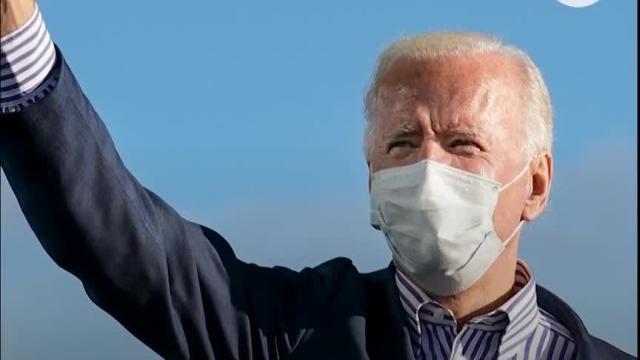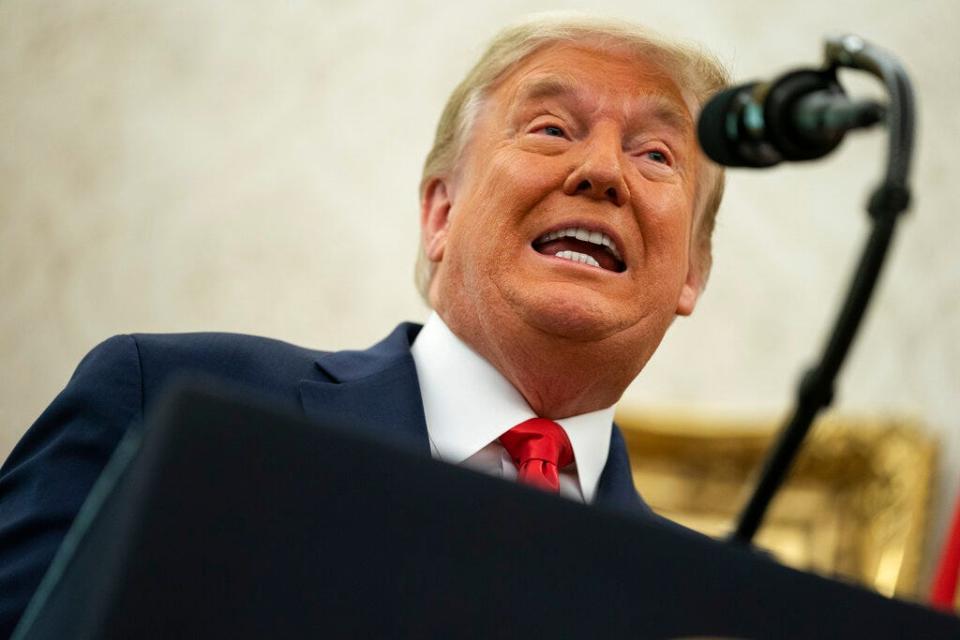Supreme Court denies effort to block election results in 4 key states that sealed Trump's fate

WASHINGTON – The Supreme Court refused Friday to let Texas challenge the election results in four battleground states critical to President Donald Trump's defeat at the polls last month, likely sealing his political fate.
"Texas has not demonstrated a judicially cognizable interest in the manner in which another state conducts its elections," the court said in a brief order. It dismissed all other related claims as moot.
The justices' action clears the way for electors to convene in 50 states and the District of Columbia Monday and all but confirm that President-elect Joe Biden will be the nation's 46th president.
Texas had made, and Trump had endorsed, an 11th-hour effort to have the nation's highest court block Georgia, Michigan, Pennsylvania and Wisconsin from casting their electoral votes for Biden Monday. Texas Attorney General Ken Paxton claimed the four states used the coronavirus pandemic as a pretext to change election rules and greatly expand mail voting in violation of the Constitution.
Within days, the last-ditch challenge had erupted into a war involving nearly every state in the nation. The four battleground states fired back, with Pennsylvania Attorney General Josh Shapiro labeling the effort to negate millions of citizens' ballots a "seditious abuse of the judicial process."
"Texas seeks to invalidate elections in four states for yielding results with which it disagrees," Shapiro told the justices in legal papers. "Its request for this court to exercise its original jurisdiction and then anoint Texas’s preferred candidate for president is legally indefensible and is an affront to principles of constitutional democracy."
Reacting to the decision, Shapiro said the high court's "swift denial should make anyone contemplating further attacks on our election think twice."
The effort was a long shot for several reasons. States run their own elections, making it a violation of sovereignty for Texas to interfere with other states' procedures. Federal law defers to states in choosing the 538 electors, and Congress ultimately counts those votes.
More: Texas AG asks Supreme Court to overturn Trump's losses in key states. Don't hold your breath.
What's more, voters in the challenged states followed the rules in voting, including by mail, and would have been disenfranchised under Texas' challenge. Lawsuits filed by the Trump campaign and allies across the country have not identified verifiable instances of fraud.
"Every American who cares about the rule of law should take comfort that the Supreme Court — including all three of President Trump’s picks — closed the book on the nonsense," Republican Sen. Ben Sasse of Nebraska tweeted.
More: For these Trump supporters primed to disbelieve defeat, challenging the election was a civic duty

And while disputes between states can go directly to the Supreme Court without first being heard by lower courts, the justices retain discretion to deny such requests. For instance, the court refused in 2016 to hear a dispute between Colorado and two neighboring states over the cross-border impact of marijuana legalization.
Associate Justices Samuel Alito and Clarence Thomas said Friday they would have granted Texas' request to make its case, but "would not grant other relief."
Earlier: Will the Supreme Court ride to Donald Trump's rescue? Don't count on it.
Some opponents of the Texas lawsuit were nonetheless disappointed by the court's brief, unsigned order. The ethics group Fix the Court lamented that it should have been a stronger denunciation.
"SCOTUS could have asserted in one voice the danger Texas’ petition poses to our democracy," the group tweeted. "Instead, it took an easy off ramp and has left us to wonder whether some of the nine are sympathetic to Texas’ seditious request."
The action was the second time in recent days that the court had turned away efforts to forestall Trump's defeat. On Tuesday, the justices denied an effort by Rep. Mike Kelly, R-Pa., and others to block the election results in Pennsylvania. Those challengers had claimed that the state legislature's 2019 expansion of mail-in voting was illegal.
Texas had contended that changes in voting procedures made by state officials in the four battleground states abrogated laws passed earlier by their legislatures, which it said have the sole constitutional authority to run elections.
"Defendant states flooded their citizenry with tens of millions of ballot applications and ballots, ignoring statutory controls as to how they were received, evaluated, and counted," Paxton wrote in igniting the firestorm Monday night. "Whether well-intentioned or not, these unconstitutional and unlawful changes had the same uniform effect – they made the 2020 election less secure."
Trump's request to intervene in the challenge endorsed widely disputed statistics intended to show that Biden's victory in the election was almost an impossibility. Among other things, he incorrectly said no presidential candidate ever lost election after winning Florida and Ohio, as Trump did. Richard Nixon endured the same fate in 1960.
"These things just don’t normally happen, and a large percentage of the American people know that something is deeply amiss," Trump's lawyers said in court papers.
All four of the challenged states told the justices Thursday that Texas' request should be slapped down.
Georgia said the justices should not "transfer Georgia’s electoral powers to the federal judiciary." Michigan said Texas "does not have a cognizable interest in how Michigan runs its elections." And Wisconsin said "the harm and public interest factors strongly weigh in favor of denying the extraordinary relief Texas seeks – stripping millions of voters of the choice they made."
This article originally appeared on USA TODAY: Supreme Court won't block election results in 4 states Trump lost